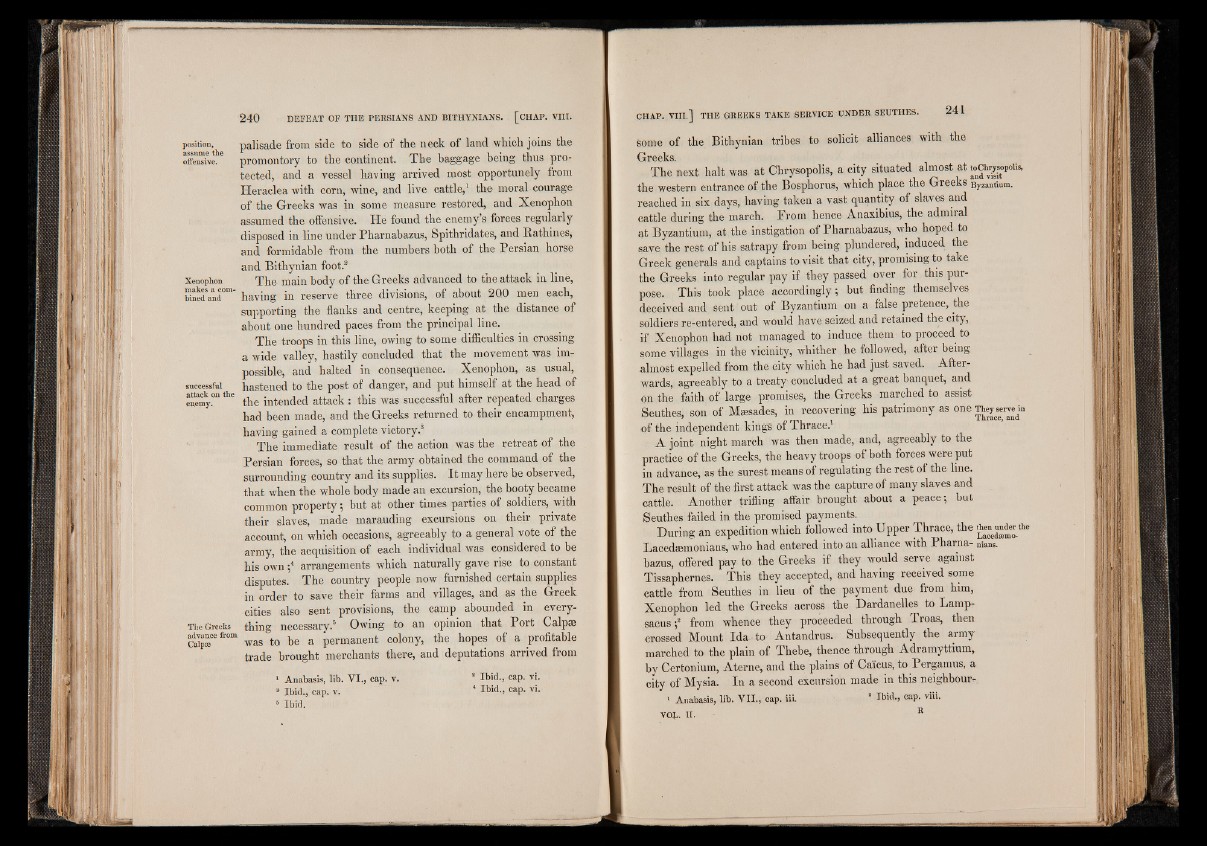
position, palisade from side to side of the neck of land which joins the
offensive.6 promontory to the continent. The baggage being thus protected,
and a vessel having arrived most opportunely from
Heraclea with corn, wine, and live cattle,1 the moral courage
of the Greeks was in some measure restored, and Xenophon
assumed the offensive. He found the enemy s forces regularly
disposed in line under Pharnabazus, Spithridates, and If athines,
and formidable from the numbers both of the Persian horse
and Bithynian foot.8
Xenophon The main body of the Greeks advanced to tne attack in line,
binedmd°m' having in reserve three divisions, of about 2Q0 men each,
supporting the flanks and centre, keeping at the distance of
about one hundred paces from the principal line.
The troops in this line, owing to some difficulties in crossing
a wide valley, hastily concluded that the movement was impossible,
and halted in consequence. Xenophon, as usual,
successiui hastened to the post of danger, and put himself at the head of
enemy.0“ the the intended attack : this was successful after repeated charges
had been made, and the Greeks returned to their encampment,
having gained a complete victory.3
The immediate result of the action was the retreat of the
Persian forces, so that the army obtained the command of the
surrounding country and its supplies. It may here be observed,
that when the whole body made an excursion, the booty became
common property; but at other times parties of soldiers, with
their slaves, made marauding excursions on their private
account, on which occasions, agreeably to a general vote of the
army, the acquisition of each individual was considered to be
his own ;4 arrangements which naturally gave rise to constant
disputes. The country people now furnished certain supplies
in order to save their farms and villages, and as the Greek
cities also sent provisions, the camp abounded in every-
The Greets thing necessary.5 Owing to an opinion that Port Calpse
¡ » t r was to be a permanent colony, the hopes of a profitable
trade brought merchants there, and deputations arrived from
1 Anabasis, lib. V I., cap. v.
3 Ibid., cap. v.
5 Ibid.
a Ibid., cap. vi.
4 Ibid., cap. vi.
some of the Bithynian tribes to solicit alliances with the
Greeks.
The next halt was at Chrysopolis, a city situated almost at ^Ch-ysopoiis,
the western entrance of the Bosphorus, which place the Greeks Byzantium,
reached in six days, having taken a vast quantity of slaves and
cattle during the march. From hence Anaxibius, the admiral
at Byzantium, at the instigation of Pharnabazus, who hoped to
save the rest of his satrapy from being plundered, induced the
Greek generals and captains to visit that city, promising to take
the Greeks into regular pay if they passed over for this purpose.
This took place accordingly; but finding themselves
deceived and sent out of Byzantium on a false pretence, the
soldiers re-entered, and would have seized and retained the city,
if Xenophon had not managed to induce them to proceed to
some villages in the vicinity, whither he followed, after being
almost expelled from the city which he had just saved. Afterwards,
agreeably to a treaty concluded at a great banquet, and
on the faith of large promises, the Greeks marched to assist
Seuthes, son of Maesades, in recovering his patrimony as one They^ryem
of the independent kings of Thrace.1
A joint night march was then made, and, agreeably to the
practice of the Greeks, the heavy troops of both forces were put
in advance, as the surest means of regulating the rest of the line.
The result of the first attack was the capture of many slaves and
cattle. Another trifling affair brought about a peace; but
Seuthes failed in the promised payments.
During an expedition which followed into Upper Thrace, the
Lacedsemonians, who had entered into an alliance with Pharna- mans,
bazus, offered pay to the Greeks if they would serve against
Tissaphernes. This they accepted, and having received some
cattle from Seuthes in lieu of the payment due from him,
Xenophon led the Greeks across the Dardanelles to Lamp-
sacus;8 from whence they proceeded through Troas, then
crossed Mount Ida to Antandrus. Subsequently the army
marched to the plain of Thebe, thence through Adramyttium,
by Certonium, Aterne, and the plains of Caicus, to Pergamus, a
city of Mysia. In a second excursion made in this neighbour-
1 Anabasis, lib. V II., cap. iii. 8 Ibid., cap. viii.
VOp. II. - R